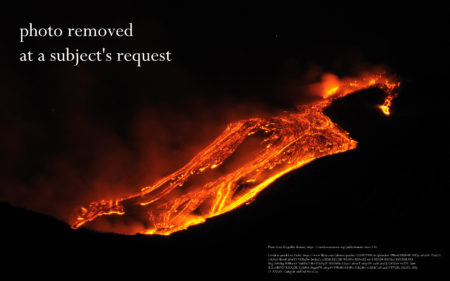[Image removed at the request of a subject (2019-10-01)]
In an era where it is increasingly sensible to think about the climatic impact of personal choices, I wonder what the implications are for investing. The whole basis for investment is the idea that someone else can put wealth to more productive immediate use than you can: so much so that you hope they will be able to achieve their productive end and return your money with interest. In a world where most economic activity involves greenhouse gas emissions, it seems inescapable that investing (particularly successful investing) has climatic consequences. That may be especially true for those who think that growth, capitalism, and climate change are deeply linked.
What is unclear is what ethical implications that has. It may well be laudable to choose to invest in things that a low-carbon world will probably involve: renewables, energy efficiency, etc. Indeed, it may be praiseworthy to do so even when that strategy entails lower returns or higher risks than an investment strategy that is indifferent to climatic considerations. Whether it is actually unethical to invest in a neutral or high-carbon way is less clear.
People who are living low-carbon lives by avoiding things like automobile ownership, excessive consumption, and air travel will likely find themselves with more savings to invest than their counterparts who don’t adopt such choices. For someone really dedicated to cutting their personal emissions, it seems plausible that the emissions induced by their investments could be a dominant part of their total footprint. As such, the secondary and tertiary effects of investment choices bear consideration.


Indeed, it may be praiseworthy to do so even when that strategy entails lower returns or higher risks than an investment strategy that is indifferent to climatic considerations.
This seems a bit like the choice military commanders make about whether or not to follow the laws of war. Doing so probably reduces the chances of them winning any particular battle. Similarly, investing in a way that drives us towards a low-carbon world requires more effort, and will probably produce less return.
Still, it seems like a laudible and perhaps necessary thing to do.
There is something strange about this, I’m not sure what it is. Something about the individualizing effects of personal investment, the fact that the structures of investment are set up to benefit particular business efforts (i.e. the bailout of toxic assets transferring risk from investors to the public). Green capitalism is only a sufficient possibility with massive subsidies, probably better overall to have more crown corporations so dividends go back to taxpayers rather than investors, when the state is taking most of the risk anyway?
Generally this comes down to, not only whether political transformation is required to deal with global warming, but also what kind of society will letting capitalism deal with global warming leave us with – will it be basically the same, or much more divided between the rich and poor?
Global warming is going to change the world politically. It seems its up to us whether the crisis makes the world a much less or much more equitable place.
I think inequality is a secondary matter here.
A more unequal world where climate change has been dealt with is far preferable to a more equal world where it has not.
It is easy as an individual to think of investments as just being numbers sitting on a computer screen, getting larger. Recognizing that invested dollars are actually out there affecting economic development and outcomes for human beings and natural systems is important.
This discussion is also linked to our discussions about hedging. The investment strategy with the highest return provides the most defence against whatever adverse elements will be present in a future world, whether it is climate change, inflation, peak oil, or something else.
Alternative energy and water resources will probably be areas of huge financial growth in the future. Maybe if you’re going to invest, you should invest in these. The eventual return will probably be handsome.
Does anyone have an index tracking fund with a low MEF that consists only of renewable energy company stock?
“A more unequal world where climate change has been dealt with is far preferable to a more equal world where it has not.”
I think this fallacy is called “false dichotomy”, in which only two outcomes are presented when in fact there are many.
I am not saying there are only two mutually exclusive options. I am saying that dealing with inequality is less important than dealing with climate change.
As discussed at length in the linked article, inequality might not even be problematic, in and of itself.
The Rainforest Action Network has created a website that estimates the carbon footprint from your bank account, based on the amount in it, and how involved each Canadian bank is in things like the oil sands.
Their full methodology (PDF) is available.
Banking: your personal contribution to extinction
It’s easy to blame RBC for the tar sands, and we should. But RBC are by no means the only Canadian financial institution which is enabling perhaps the biggest climate crime ever committed by humans against their own habitat. The Rainforest Action Network’s “Climate friendly banking” site pegs TD-Canada Trust’s’ Co2 from total financed emissions at 124 million tonnes, or nearly a tonne per 10,000$ of checking account holdings.